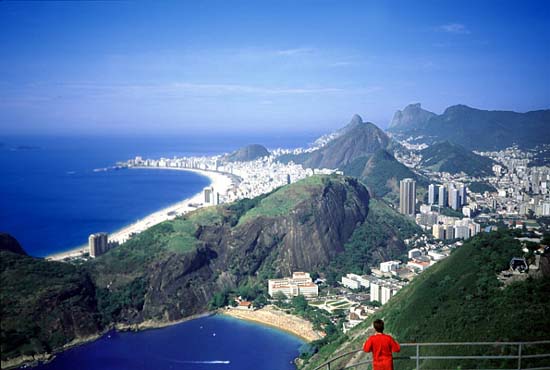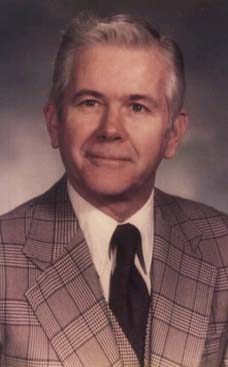
Observers of Latin American politics have long been puzzled by the great disparity between the character and development levels of the very different Latin American societies, and particularly their contrast to the uniform and wavelike patterns of authoritarianism that have nonetheless swept over most of them at regular intervals in the past. Exogenous and endogenous variables have been proposed to explain this conundrum, usually as single-causal explanations, and with relatively little explanatory power. Chief among the exogenous variables in the last wave of authoritarianism in the 1960s and 1970s were the direct influence of US foreign policy, and the impact of communism.
RPCV Daniel Zirker writes "Property Rights, Democratization, and Military Politics in Brazil"
PROPERTY RIGHTS, DEMOCRATIZATION, AND MILITARY POLITICS IN BRAZIL
Jul 1, 2005 - Journal of Political and Military Sociology
[Excerpt]
A generalized breakdown of the absolute rights traditionally associated with property ownership in Brazil, best exemplified by the increasing activity of the Landless Movement (MST), points to the likelihood of a regrowth of interventionist and authoritarian tendencies on the part of the armed forces of Brazil. This study examines some of the theoretical and empirical links, and their political implications.
"...no one governs in Latin America without the Armed Forces. "
General Lenidas Pires Gonalves
ex-Minister of the Brazilian Army, 1993
"Military conservatism predicates the indispensability of private property as the basis of a stable political order. At present, as in the past, the military professional can conceive of no other arrangement."
Morris Janowitz
The Professional Soldier
Property ownership sits at the heart of the modern age. From well before the Enclosure Acts in England, beginning in 1801, the struggle over property and property rights defined historical periods in much of the world. As national populations have grown, unrestricted property rights, and their inevitable concomitant, the latifundium, have increasingly collided with poverty and minifundia, and this has led to subsequent pressures to qualify and limit the absolute and unconditional ownership of property.
Observers of Latin American politics have long been puzzled by the great disparity between the character and development levels of the very different Latin American societies, and particularly their contrast to the uniform and wavelike patterns of authoritarianism that have nonetheless swept over most of them at regular intervals in the past. Exogenous and endogenous variables have been proposed to explain this conundrum, usually as single-causal explanations, and with relatively little explanatory power. Chief among the exogenous variables in the last wave of authoritarianism in the 1960s and 1970s were the direct influence of US foreign policy, and the impact of communism.
Primary endogenous explanations have revolved around military establishments qua institutions, usually the direct instruments of authoritarianism, and have included deep social phenomena (e.g., inequality, alienation, isolation), social irritants (e.g., crime, corruption), and the sense of a breakdown in fundamental institutions, including the organizational integrity of the military, and even military representation of the unfelt needs (breakdown?) of an incipient middle class (Nun, 1967; Zirker, 1998). The post-Cold War period, however, has been a dramatic period of democratization in Latin America, with a deepening of grass-roots voluntary associations as well as the establishment of national- level representative democracy, delaying, at the very least, any possible new "wave" of military interventions.
There is a certain elegance in the argument that the hallowed Latin American institution of unrestricted (absolute) property rights, and especially the gradual qualification of that institution, may be among the factors that ultimately come to explain authoritarian and democratic tendencies in the many and diverse Latin American societies. Social science, while accepting that there have only been two stable organizations over the past 500 years in most Latin American societies (the army and the Catholic Church), has long fixated on more abstract explanations, from social class dynamics (Nun, 1967) to behavioral responses and even rational choice theory.
In view of all of this, "revolutions" in Latin America have been defined primarily as the dismantling of national military establishments. The Latin American revolutions in Mexico, Bolivia, Cuba and Nicaragua represented the destruction (albeit, with the subsequent reconstruction) of entire national armed forces. And if the civil and non-violent abolition of the armed forces of Costa Rica and Panama were not "revolutionary," they have certainly been portrayed as dramatic political transformations in the Latin American context. As it happens, the major Latin American revolutions have also, invariably, changed the owners, if not the fundamental institution, of property, at least in the short term.
Property ownership, a logically unrelenting institutional arrangement, is at once extraordinarily European in its origins, and restrictive, prescriptive, exclusionary and proscriptive (Becker, 1977), a rather unlikely survivor in the multicultural amalgam of Latin America. Its sudden modification in countries like Cuba and Nicaragua, which should not have been surprising, had unexpectedly far-reaching and profound effects. Even outside of Latin America, the institution of private property ownership has largely survived and shed much of its global ideological opposition2 despite a worldwide growth in population and its attendant pressures upon the logic and reality of unrestricted property rights, especially in developing countries.
It is significant, then, that at this juncture in world history, a number of Latin American countries seem to be witnessing an overt and potentially expressive rejection of unrestricted rights to property ownership. The following study proposes to explore briefly the current vulnerabilities of Brazil to this endogenous concern that has arguably been of import in past authoritarian "waves," and that is currently demonstrating great volatility on the national and global stages. The progressive weakening of unlimited property rights in Latin America is historical and sweeping in scope, and has only recently been unlinked to historical charges of an international communist conspiracy.
Nonetheless, US concerns with global political competition, framed in ideological language, have triggered strong US legislation and responses from the State Department that continue to hold sway into the current period.3
The character of the breakdown varies across Brazil, but is generally related to the unmet aspirations and needs of a vast majority of its citizens, and the continuing unity of elite classes. Osvaldo Sunkel, referring to the wider Latin American context, noted in 1995 that
There is an ever stronger bond between segments of the upper and middle classes, the local bourgeoisie and technocracy, and the multinational economic, financial, military, and technological structures and the media around a highly homogeneous and integrated nucleus that shares similar lifestyles and strong political and sociological affinities. This, at the same time, has led to the disintegration and exclusion of much of the rest of society, restricting it to the national periphery, divided up into activities, regions, and socially subordinated groups, marginalized, backward, isolated, and crushed by poverty.
(Sunkel, 1995: 117)
As James C. Davies and others adroitly noted in the 1960s, it is not absolute but rather relative deprivation that has tended to trigger political violence in the past, although in recent years in Brazil such responses have also tended to be in the form of direct action. Direct and potentially violent threats to unlimited property rights are not a new circumstance, but in an era of grassroots democracy and voluntary association, they represent a profound, and increasingly successful, avenue to societal change. Such activities are further complicated by a resurgence of popular support of most Latin American military establishments concurrent with apparent and growing popular disenchantment with democracy.4
The following study seeks to explore some of the implications of this growing qualification of property ownership in the context of military politics in Brazil. The Landless Movement (Movimento sem Terra, or MST) in Brazil, which may be "the largest and most powerful social movement in Latin America," and is said to have emerged as a result of the agricultural and land policies of the 21- year military dictatorship (Vanden, 2005: 23), has led to a wave of challenges to unrestricted property ownership, including the "invading" and occupying large estates throughout the country, and moving beyond this to urban dwellings and to the establishment of limits on the exploitation of Amazonia.
The Brazilian military is itself-for all intents and purposes-a property owner, and is hence corporately caught up in this emerging transformation. Moreover, Brazil borders on nine countries (and a colony), many of which are now experiencing direct property challenges similar to the MST-in some cases involving direct linkages with that organization, and tactical movement in both directions across Brazil's borders.5 The Brazilian armed forces are in the midst of an unprecedented buildup of troop strength in Amazonia, to over 25,000 (Latin American Newsletters, 2003c; 2004a).
At a time when profound population growth has pushed many societies to the brink of "ungovernability," it is interesting and instructive that Latin American politics has now underscored the absolute right to property ownership as the institution that appears to be most threatened and, indeed, threatening to the persistence of the current democratic "wave." By identifying the MST as "violent," senior military leaders set the stage some time ago for a future and potentially dire confrontation.6 With one percent of Brazil's landowners controlling 45 percent o\f the nation's farmland, and huge tracts of land in Amaznia having been appropriated illegally (Latin American Newsletters, 2003b),7 the focus upon the MST as a disrupter of order and purveyor of violence seriously distorts a clear understanding of a profound emerging reality.
The MST proposes nothing less than the complete agricultural restructuring of Brazil, and the elimination of the latifundium (Vanden, 2005: 24). With somewhere between 200,000 and 400,000 active members, and extraordinarily effective mobilization capabilities (Vanden, 2005: 23), it is similar in numbers at least to the Brazilian armed forces. A protracted and continuing rise in tensions between large landholders and the rural poor, as represented by the MST, largely over the question of absolute rights of property ownership, is destined to involve the military.
The current government of Luis Incio (Lula) da Silva does not seem to have substantially altered this dynamic; indeed, land invasions and direct challenges to government policy are rapidly increasing. While the MST has worked closely with the Workers' Party (PT) at the local level, and contributed directly to Lula's 2002 electoral victory, the PT government seems to lack the will to support the MST agenda (Vanden, 2005: 26). The MST has felt increasingly that it is pitted against the Lula government (e.g., Latin American Newsletters, 2003 a; 2003b), particularly as it emphasizes (and is rebuffed in) settling on state-owned land.
DANIEL ZIRKER
The University of Waikato
Hamilton, New Zealand
DANIEL ZIRKER is the Dean of the Faculty of Arts and Social Sciences, and Professor of Political Science at The University of Waikato in Hamilton, New Zealand. He is currently (since 1999) the chair/president of the Research Committee on Armed Forces and Society of the International Political Science Association, and the President of the New Zealand Political Studies Association (2004- 05). A former U.S. Peace Corps volunteer in Northeast Brazil (1970- 72), he was a Fulbright senior lecturer at the University ofDar es Salaam (Tanzania-East Africa) during the 1989-90 academic year. He has published in academic journals on democratization, economic development and civilmilitary relations in Brazil as well as in Africa and Eastern Europe.
His e-mail address: dzirker@waikato.ac.nz
Copyright Dr. George Kourvetaris Summer 2005










